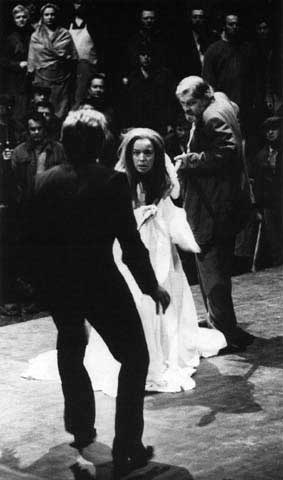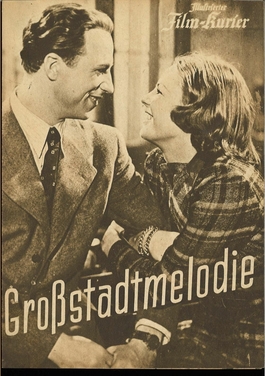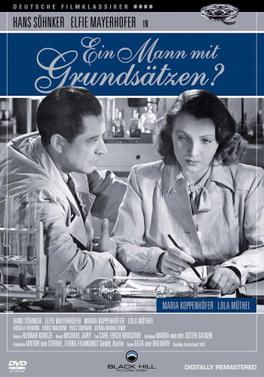External links
- Wolfgang Maria Bauer at IMDb
- Agency unit|one (in German)
Wolfgang Maria Bauer | |
|---|---|
| Born | Wolfgang Maria Bauer 9 June 1963 |
Wolfgang Maria Bauer (born 9 June 1963) is a German television actor, theatre director and author.

Gustav Benjamin Schwab was a German writer, pastor and publisher.

Christiane Hörbiger was an Austrian stage, film, and television actress. Her first major film role was Mary Vetsera in Kronprinz Rudolfs letzte Liebe in 1955. She appeared on the stage of the Burgtheater as Recha in Lessing's Nathan der Weise in 1959, became a member of Theater Heidelberg and later Schauspielhaus Zürich. From 1969 to 1972, she portrayed Die Buhlschaft in Hofmannsthal's Jedermann at the Salzburg Festival.

Fritz Bauer was a German Jewish judge and prosecutor. He was instrumental in the post-war capture of former Holocaust planner Adolf Eichmann and played an essential role in beginning the Frankfurt Auschwitz trials.

Erik Ode was a German director and actor who was most famous for playing Kommissar Herbert Keller in the German television drama Der Kommissar. He married actress Hilde Volk in 1942. Many years later they co-starred together in the TV series Sun, Wine and Hard Nuts.

Wolfgang Huber is a prominent German theologian and ethicist. Huber served as bishop of the Evangelical Church of Berlin-Brandenburg-Silesian Upper Lusatia until November 2009. Huber succeeded Manfred Kock as Chairperson of the Council of the Evangelical Church in Germany (EKD) in November 2003 and was succeeded by Bishop Margot Käßmann, the first woman in that position, in October 2009.
Wolfgang Arthur Reinhold Koeppen was a German novelist and one of the best known German authors of the postwar period.

The Kurd Laßwitz Award is a science fiction award from Germany. The award is named after the science fiction author Kurd Laßwitz. Eligible for nomination in all categories except for the Foreign Work category are only works published in German originally.

Leonhard Wolfgang Bibel is a German computer scientist, mathematician and Professor emeritus at the Department of Computer Science of the Technische Universität Darmstadt. He was one of the founders of the research area of artificial intelligence in Germany and Europe and has been named as one of the ten most important researchers in the German artificial intelligence history by the Gesellschaft für Informatik. Bibel established the necessary institutions, conferences and scientific journals and promoted the necessary research programs to establish the field of artificial intelligence.
The Leipzig Book Fair Prize is a literary award assigned annually during the Leipzig Book Fair to outstanding newly released literary works in the categories "Fiction", "Non-fiction" and "Translation". The Leipzig Book Fair Prize has been awarded since the Deutscher Bücherpreis was ceased in 2005, and is one of the most important literary awards in Germany. The winner in each category is awarded €15,000.
Wolfgang Hilbig was a German writer and poet.
Stimmen der Zeit is a monthly German magazine published since 1865 by Herder publishers. Its subtitle is Zeitschrift für christliche Kultur, and it publishes articles on Christian culture in the broad sense of the word. It is considered one of the most authoritative German journals in its field.

Falk Harnack was a German director and screenwriter. During Germany's Nazi era, he was also active with the German Resistance and toward the end of World War II, the partisans in Greece. Harnack was from a family of scholars, artists and scientists, several of whom were active in the anti-Nazi Resistance and paid with their lives.

Maria Matray was a German screenwriter and film actress. Matray became a star of late Weimar cinema.

The Jahrhundertring was the production of Richard Wagner's Ring Cycle, Der Ring des Nibelungen, at the Bayreuth Festival in 1976, celebrating the centenary of both the festival and the first performance of the complete cycle. The festival was directed by Wolfgang Wagner and the production was created by the French team of conductor Pierre Boulez, stage director Patrice Chéreau, stage designer Richard Peduzzi, costume designer Jacques Schmidt and lighting designer André Diot. The cycle was shown first in 1976, then in the following years until 1980. It was filmed for television in 1979 and 1980. While the first performance caused "a near-riot" for its brash modernity, the staging established a standard, termed Regietheater, for later productions.

Melody of a Great City is a 1943 musical drama film directed by Wolfgang Liebeneiner and starring Hilde Krahl, Werner Hinz and Karl John. A young woman moves to Berlin to work as a press photographer.

A Man With Principles? is a 1943 German comedy film directed by Géza von Bolváry and starring Hans Söhnker, Elfie Mayerhofer, and Sigrid Becker. A young female chemist moves to Hamburg for research where she encounters a handsome, but extremely sexist male colleague. Eventually she manages to conquer his affections and changes his attitude towards woman.
Wolfgang Rademann was a German television producer and journalist.

The State Academy of Fine Arts Stuttgart is a university in Stuttgart, Germany. Founded on 25 June 1761, and located since 1946 on the Weißenhof, the Academy, whose historical significance marks names such as Nicolas Guibal, Johann Heinrich von Dannecker, Bernhard Pankok, Adolf Hölzel, Willi Baumeister, Herbert Hirche, K.R.H. Sonderborg, Alfred Hrdlicka, Heinz Edelmann, Marianne Eigenheer, Richard Sapper, Joseph Kosuth, David Chipperfield, Joan Jonas, Micha Ullman, offers from all art universities in the federal state Baden-Württemberg the largest numbers of courses, namely all disciplines of the visual field, and not just in an organizational network but also under one roof. This is essentially the result of the connection of the former Academy of Fine Arts with the former School of Applied Arts in 1941 as Staatliche Akademie der bildenden Künste Stuttgart, which was reconstituted by Theodor Heuss in 1946 under the same name and which aimed at a broad training program as well as an intensified development in the following decades. Under the rectorate of Wolfgang Kermer, on 22 February 1975, the ″Gesetz über die Kunsthochschulen im Lande Baden-Württemberg (Kunsthochschulgesetz)″ passed by the Landtag of Baden-Württemberg came into force, which for the first time in the history of the State Academy of Fine Arts Stuttgart regulated the status and the essential relationships and which guaranteed the equality of rank with universities.

Wolfgang Händler was a German mathematician, pioneering computer scientist and professor at Leibniz University Hannover and University of Erlangen–Nuremberg known for his work on automata theory, parallel computing, artificial intelligence, man-machine interfaces and computer graphics.
pardon was a German satirical magazine, which appeared biweekly from 1962 to 1982. It was published to criticise the conservative situation of the Adenauer era.